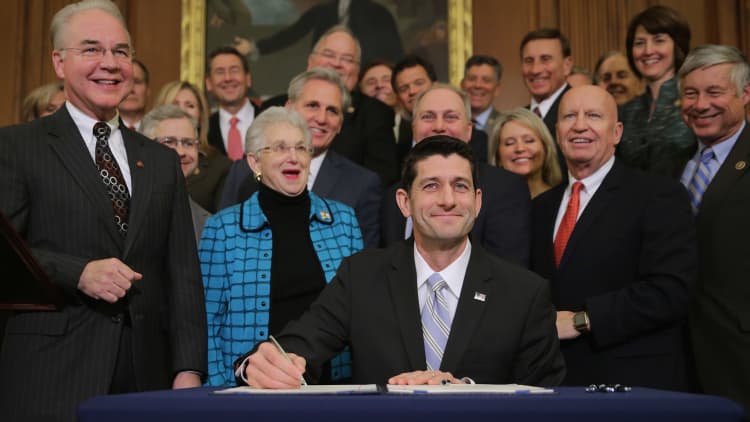
While a vote to repeal Obamacare would fulfill one of President Donald Trump's top campaign pledges, it could undermine another one: creating American jobs.
Research from Goldman Sachs this week found that roughly 500,000 jobs have been created in the health-care sector since 2012, as more Americans signed up for insurance under the Affordable Care Act. The analysis suggests health-care reforms that result in lower insured rates, such as the GOP's proposed American Health Care Act is expected to do, could have wide-ranging implications for job growth in the industry.
"The upshot from our analysis is that a substantial decline in health insurance coverage would likely be associated with a drag on health-care employment and health-care consumption, reversing some of the increase that occurred following the onset of [Obamacare] subsidies," Goldman economists Daan Struyven and Alec Phillips wrote in a note.
Employment in the health-care and social assistance sectors accelerated more in states that saw the largest coverage expansions.Daan Struyven and Alec Phillipseconomists, Goldman Sachs
Nationwide, health insurance coverage has increased by 5.4 percent since 2012, according to the analysis. By looking at coverage rates across states, Goldman estimated that every percentage point increase of Americans with health insurance resulted in a 0.6 percent increase in health-care employment and consumption. The research found job growth accelerated in states with the biggest increases in coverage, such as California and Nevada.
"Employment in the health-care and social assistance sectors accelerated more in states that saw the largest coverage expansions," the economists said.
A separate study published last week by the Oregon Health Authority and Department of Consumer and Business Services found roughly 23,000 health-care jobs have been created in Oregon since the Affordable Care Act was implemented. The report warned those jobs are at risk under the Republican repeal-and-replace proposal.
"Reductions in coverage and funding of this magnitude will ripple throughout Oregon's economy, especially in rural communities where health-care accounts for a disproportionate number of well-paying jobs," the study said.
'It wasn't a job-killing act'
Ani Turner is co-director of the Center for Sustainable Health Spending at the Altarum Institute, a nonprofit research firm that issues monthly reports on health-care jobs. She said more Americans are seeking health-care services as they've become insured under the Affordable Care Act, which in turn creates greater demand for jobs in the health-care sector.
"I think the evidence is clear that it wasn't a job-killing act," Turner said. "We believe that it did add jobs, certainly in health care."
Turner said health-care firms have added revenue as more Americans seek care, another factor leading to job growth in the industry. She pointed to an acceleration in the rate of health-care job growth starting in 2014, the year when most states started implementing expanded coverage under Obamacare.
"This acceleration, the bump up in hiring, I don't know why it wouldn't dissipate if all of these folks lost insurance and the payment that goes along with it," Turner said.

More than 15 million Americans are employed in the health-care sector, according to the Bureau of Labor Statistics, and job losses in the industry could pose obstacles to President Trump's economic agenda. The Congressional Budget Office estimated the American Health Care Act, which faces a key vote Thursday, could result in 24 million more people losing insurance than under the current law, by 2026.
The CBO report did not include estimates of employment under the proposed legislation but found it would shave roughly $337 billion from the federal budget deficit over 10 years.
Mizuho's chief U.S. economist, Steven Ricchiuto, warned against extrapolating jobs figures from health-care reform against the broader economic impact of the president's agenda, including tax cuts and spending initiatives.
"This is just one component, and trying to identify the losses created by this against the potentially larger gains by the package is fraught with a lot of potential error," said Ricchiuto said.


